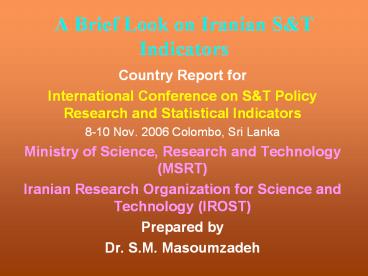A Brief Look on Iranian S&T Indicators - PowerPoint PPT Presentation
1 / 23
Title:
A Brief Look on Iranian S&T Indicators
Description:
A Brief Look on Iranian S&T Indicators Country Report for International Conference on S&T Policy Research and Statistical Indicators 8-10 Nov. 2006 Colombo, Sri Lanka – PowerPoint PPT presentation
Number of Views:41
Avg rating:3.0/5.0
Title: A Brief Look on Iranian S&T Indicators
1
A Brief Look on Iranian ST Indicators
- Country Report for
- International Conference on ST Policy Research
and Statistical Indicators - 8-10 Nov. 2006 Colombo, Sri Lanka
- Ministry of Science, Research and Technology
(MSRT) - Iranian Research Organization for Science and
Technology (IROST) - Prepared by
- Dr. S.M. Masoumzadeh
2
Introduction
- Iran has relatively developed its own science and
technology infrastructure compared to other
developing countries in the region. - It also built up a significant industrial base,
mainly by licensing technology from abroad. - The export of high-tech industrial products is
narrow.
3
Introduction Cont.
- Iran has pursued a development strategy of
self-reliance with some degree of success. - Iran needs to shift towards a more
knowledge-based economy. It needs to improve the
performance of its national innovation system. - Iran has to make serious effort to promote its
ST indicators.
4
Economic Indicators
- Population 69.7 Millions
- Growth Rate 1.29 annually
- Urban 66
- Total adult literacy rate 77.3 (men 83, women
70) - Share of Education expenditures of GDP 11.3
- 20 million students at schools
5
Economic Indicators (Cont.)
- Near 2 million university students
- GDP 177.9 billions
- Non-oil Exports around 10 billions
- Major exports petrochemicals, carpet,
agricultural and fisheries products - Government controls over 80 of the economy
6
Contribution of different sectors in GDP ()
Source World Development Indicators, 2005
7
Structure of Manufacturing
- Iranian industries include handicrafts, small
rural and urban workshops, large-scale consumer
goods, and modern heavy industries. - Small industrial workshop is those employing 9
individuals or fewer both in rural and urban
areas. - Large-scale manufacturing enterprises are defined
as those employing 10 or more workers.
8
Structure of Manufacturing(Cont.)
- This sector comprises of 9 major groups
- Food, beverage and tobacco
- Textile, clothing and leather industry
- Wood and wooden products industry
- Paper and paper industry
- Chemicals and chemical
- Other non-metallic mineral
- Basic metals
- Machinery and equipment
- Miscellaneous industry
9
Structure of Manufacturing (Cont.)
- No more than 24000 were classified as large
formal companies but these accounted for lions
share of value-added in manufacturing. - The manufacturing, value-added of GDP in 2003 was
only 12.5 percent. It engaged 17.8 of the
employed labor force in 1996.
10
(No Transcript)
11
Science and Technology Indicators
- Research Base
Number of Iranian Governmental Research Institutes
Source Science Policy Quarterly 1994UNDP, 2005
12
Science and Technology Indicators(Cont.)
- University Education
- In 2005-2006, 52 of all enrollments in
university degree programmes was in the private
sector and the rest was in public sector. - 28 of all university enrollments were in
engineering. - Pure science 11
13
Science and Technology Indicators (CONT.)
- Medical science 6
- Social science 44
- Art 4
- Agriculture 7
14
Science and Technology Indicators (Cont.)
- According to official sources, more than 750,000
students enrolled in public universities and more
than 1,250,000 in private sector in 2005/06. - The number of faculty members has been increased
to 79,617 (40,536 full time and 39,081 part time
members) in Academic year 2005/06.
15
Science and Technology Indicators (Cont.)
- The number of scientific articles published in
international journals, increased from 281 1n
1992 to 3349 in 2004.
16
Science and Technology Indicators (Cont.)
- RD Expenditure
- The input (resources) are often into Financial
and Human resources - In last two decades the Iranian RD expenditure
was fluctuated between 0.2 and 0.4 percent of the
GDP. In comparison with the other developed
countries is far behind,
17
Science and Technology Indicators (Cont.)
RD Expenditure ( OF GDP) in some Countries
Source World Development, 2005RD Society of
Iranian Industries and Mines2006
18
Science and Technology Indicators (CONT.)
- The major source of Iranian RD expenditure comes
from the governmental sector while the share of
private sector is very small. - Human resources in science and technology are one
of the key resources for economic growth. - Iran with 484 researchers per million in RD.
19
Science and Technology Indicators (CONT.)
Researchers in RD (per million people)
1990-2003
Source World Development Indicators, 2006
20
Science and Technology Indicators (Cont.)
- Iranian National Innovation System (NIS)
- The major actors in the Iranian NIS are
government ministries, research institutes,
universities and majority of large enterprises. - Innovation activity in Iran is supply-driven.
21
Conclusion
- Share of the private sector in RD expenditure is
very small. - Iran with about 0.4 of GDP allocated to RD is
far behind industrialized countries. - The number of scientists and researchers much
lower. - Iran has expended its universities and the number
of faculty members. - Students have grown manifold.
22
Conclusion
- The numbers of scientific articles published in
international journal has been increased sharply. - The innovation activities in Iran are driven not
by demand but by government planes.
23
- Thank you































